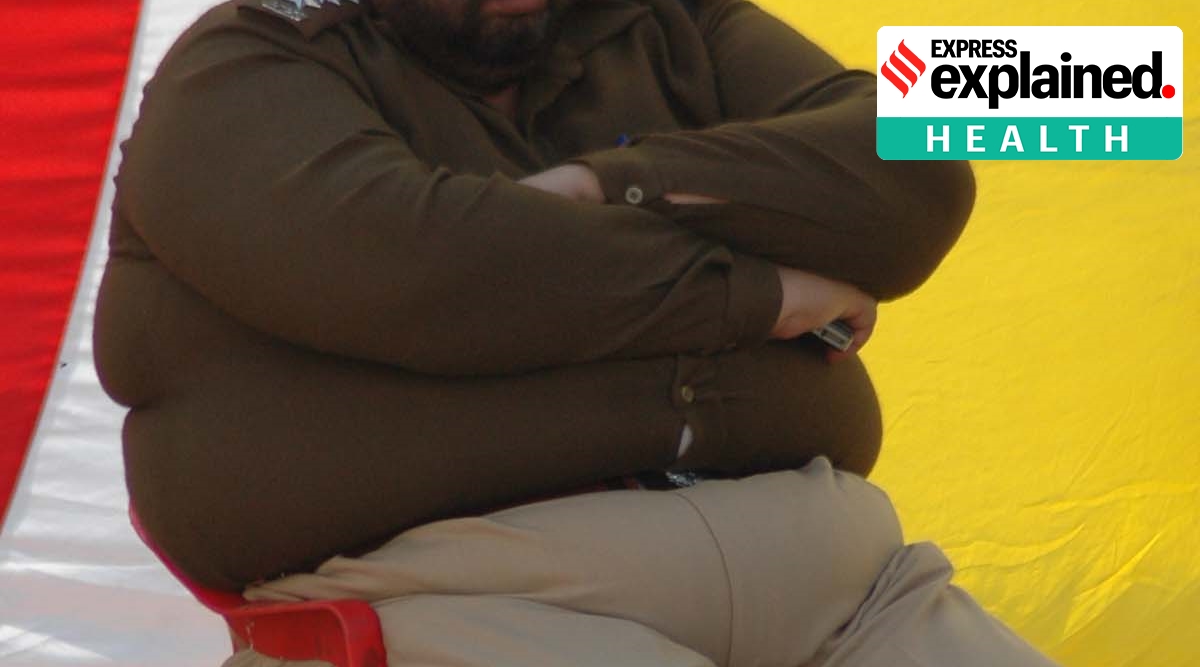Assam, Haryana pull up overweight cops: The big fat problem in law enforcement
Across the world, police forces are replete with overweight officers. While reasons for this may differ from person to person, studies have identified larger systemic issues.
 While recent orders aim to individually pull up fat policemen, the problem of obesity in the police force is more systemic. (Express Photo by Swadesh Talwar)
While recent orders aim to individually pull up fat policemen, the problem of obesity in the police force is more systemic. (Express Photo by Swadesh Talwar) Overweight Haryana policemen will be transferred to police lines until they regain their fitness, an order issued by Haryana’s Home and Health minister Anil Vij on Thursday (May 18) said. In the order, Vij said that many police personnel in the state had become overweight, with their weight only increasing over time.
Haryana’s order came after the Assam Police on Tuesday (May 16) said it will start offering voluntary retirement to all obese personnel if they fail to reduce their weights by November this year. The force will make the decision after testing the personnel’s Body Mass Index (BMI) starting in August with individuals having a BMI of 30+ facing “voluntary retirement”, unless they have “genuine medical reasons”.
A common problem in police forces
This is not the first time this issue has come up in India.
In 2018, the Karnataka State Reserve Police told its personnel to slim down or potentially lose their jobs. The decision was made after over a 100 policemen died in just over a year in the state due to lifestyle-related diseases, linked to obesity.
In 2012, Andhra Pradesh introduced extensive physical training for its police officers, after reports showed that nearly 40 per cent of the force was overweight.
In fact, the issue of obesity has plagued law enforcement agencies across the world. From the United States to Pakistan, many nations have attempted to reduce the incidence of obesity among their police forces. While the specific reasons for being overweight may differ from person to person, studies have shown that the problem might be systemic.
All a part of the job
Multiple studies have shown that police personnel’s working conditions play a key role in their obesity.
Popular culture has historically depicted police work as being extremely active, involving high octane foot chases and physically demanding fist fights. However, while policemen might be faced with physically demanding challenges on the odd occasion, more often than not, their work is largely sedentary, involving long hours of sitting and little excercise. This makes police personnel more prone to obesity than what one would think. While they may enter the force after clearing fitness tests, over time, the sedentary lifestyle takes its toll.
Apart from the inactivity, stress is another contributor to obesity. In India, police personnel have long, often uncertain hours of duty, with little relief and low pay. Furthermore, on a daily basis, cops are exposed to stressful situations, from violent crime to managing massive crowds. Years of such exposure can have a tangible impact on a policeman’s mental and physical well-being. Studies have shown that stress is one of the leading causes of obesity in the world.
Uncertain work hours also impact police personnel’s sleep schedule. Multiple studies have linked erratic sleep schedules and inadequate sleep to obesity.
Lastly, while on the job, police personnel often do not eat proper, healthy meals. Fried snacks such as samosas and kachoris are popular, and when put together with all other factors, can lead to a high incidence of obesity in the forces.
No easy solution
Given the many systemic factors behind police personnel’s obesity, orders such as the ones issued in Haryana and Assam are at most stop-gap measures. While singling out individual police officers and telling them to “get fit” is the easiest thing the government can do, without addressing larger concerns about working conditions, they are inadequate.
Furthermore, the metrics to judge fitness have to be more holistic than the ones often used by the forces. For instance, Assam will determine the fitness of police personnel using the Body Mass Index (BMI).
BMI is calculated by dividing a person’s weight by the square of their height (in metres), and is used around the world to decide whether an individual is healthy, overweight or obese. But it is also highly controversial – several experts have argued that using BMI as a measure of health is flawed as it is inaccurate, unscientific and designed for white, European men.
Lastly, studies have shown that singling out individuals and treating obesity purely as an outcome of poor lifestyle choices is not conducive to bringing positive change.
When the Assam Chief Minister Himanta Biswa Sarma said a few weeks ago that police personnel in the state would be asked to retire early because they were “habitual drinkers” and “physically unfit”, effectively, he individualised the issue rather than addressing the underlying causes behind the obesity.
- 01
- 02
- 03
- 04
- 05






































